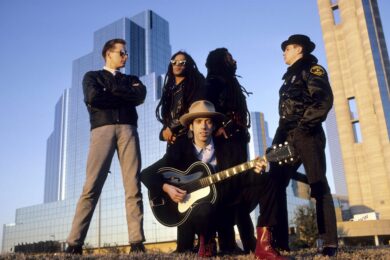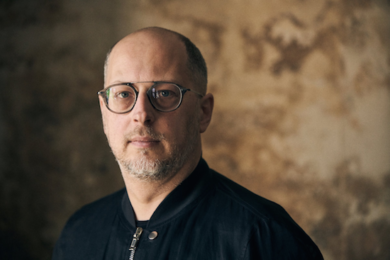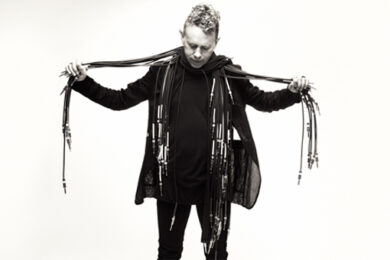Even though the beast had its head cut off before it could conquer the world, Hanoi Rocks were the first rock band coming out of Finland to reach really dizzy heights. Frontman Michael Monroe is the elder statesman of rock & roll in his home country, he’s a national institution. Hanoi and Monroe are the example and the standard set for any budding musicians keen to escape the country’s cold climate and the small club circuit.
Monroe is still a bundle of energy; he speaks very matter-of-factly and does not betray noticeable nostalgia or affection in his voice when talking about Finland. In that way he is a typical, understated Finn. But that is the only understated thing about him. He also holds a strict no regrets policy and happily resigns himself to the hand he was dealt. When asked if he would trade his fame in Finland for more global recognition, Monroe is adamant: “I wouldn’t trade anything for anything. I’m happy as I could be.
“I don’t feel the need to trade anything. I get recognized a lot there, but what I do is sign cards ahead of time so I can hand them out to people as autographs so it takes less time. If I start signing stuff there, there’s going to be a queue before long. In the States I can just walk around but people do always come up and go ‘You are somebody aren’t you?! You look like you’re famous, like a rock star.’ And I just say ‘Yeah, well I’m a rocker’. I would never say ‘star’ though.”
Looking back on the original Hanoi Rocks days, Monroe discusses his peers at the time who in adhering to the stereotypical rockstar rhetoric have made him feel “ashamed to be a lead singer”, and though he doesn’t point his polished nail directly at a certain Motley Crue fontman, there can be no better example. In fact, Vince Neil’s excesses arguably cost Hanoi dearly. In 1984 he drunk-drove his Pantera headlong into an oncoming vehicle during a liquor-run with Hanoi drummer Nicholas ‘Razzle’ Dingley. Razzle did not survive the crash, and two others were left with lasting injuries, while Neil only suffered a 30-day jail sentence.
Shortly after the accident, things came to a head between bassist Sami Yaffa and the allegedly insufferable guitarist/lead songwriter Andy McCoy, leaving the band entirely without rhythm section. After an attempted regrouping and the hiring of replacements, Monroe felt the magic fizzle out and made the decision to leave as well, effectively ending the band. He emerged from the mayhem determined to prove he wasn’t just the pretty blonde puppet of the Andy McCoy show, and with the help of friends such as The Dead Boys’ Stiv Bators, Monroe began to hone his particular brand of songwriting.
Meanwhile the Hollywood glam rock scene of the 1980s was beginning to explode – not in least thanks to the influence of Hanoi Rocks. Among the bands that blasted out of L.A. at the time were Poison, Motley Crue, Jetboy and Guns’N Roses. G’NR were particular champions of Hanoi with Axl Rose even appearing in Monroe’s video for ‘Dead, Jail Or Rock’N’Roll’ off his second solo album (and most successful to date) Not Fakin’ It. Monroe also contributed vocals to a cover of The Dead Boys’ ‘Aint It Fun’ on the Guns’ The Spaghetti Incident? as a tribute to the late Bators.
In 2002, after several solo albums and a couple one-album bands (Jerusalem Slim, Demolition 23) Monroe reconnected with Andy McCoy and reformed (or their "regurge" as Monroe puts it) Hanoi Rocks. The reunion was marked by a more collaborative songwriting process as McCoy paid respect to Monroe’s years of slogging it out on his own. Six years, three albums and thousands of happy fans later, the pair decided they had found the musical limits of Hanoi and resolved to put it down, playing a series of final shows at the club in Helsinki where they had began with a guest appearance from Nasty Suicide – who had since become a pharmacist.
Since then the Michael Monroe band has gone through a few line-ups – including an album with Ginger of The Wildhearts – settling on the current crew of Monroe, Yaffa, Steve Conte (New York Dolls), Dregen of Hellacopters/Backyard Babies and drummer Karl Rockfist. His latest record Horns And Halos is a strutting, consistent continuation of Monroe’s brand of rawk, but without seeming dated or coming across as a throwback.
At 51, Monroe is in incredible shape and can split jump, swagger and scale the rafters around any of his contemporaries still performing today, not to mention the younger rock contingent.
Before we sat down for the formal interview, Monroe proudly showed off his new – well “seven gigs old” – black stretch jeans with custom red starred leather panelling down the sides. He designed them himself with the help of a leatherworker in Helsinki, he tells me, and there is a matching vest to go with it. The blonde hair is still as big as ever and his eyes – which really need no artificial help to make them pop – remain licked in kohl. Former Hanoi Rocks member Sami Yaffa – who has continued to work with Michael over the years and over many projects – pops in on us in the dressing room wearing a sharp vest and tie to provide some perspective on just how consistently Monroe has maintained his image since the early days of Hanoi. He’s been pressured by many a label and manager into changing his outlandish style, but the day you see Michael Monroe fresh-faced clad in straight jeans and a t-shirt you better bring an umbrella because pig shit will be raining from the sky.
His answers may often be sprinkled with the borderline preachy rock clichés of ‘don’t sell your soul’ and ‘be true to yourself’, but this is one man that has lived his rock & roll life with the most minimal of hypocrisy – and that’s saying a hell of a lot.

With that status that you have in Finland and with having that impact on the country’s pop culture, do you feel you changed the way music is played and listened to in Finland?
Michael Monroe: I think we’ve opened some doors for newer bands who come out of Finland. Back in the day with Hanoi Rocks, at that time progressive rock was pretty big and there were a lot of serious musicians who were self-indulgent and would play 20-minutes with their back to the audience with their greasy hair and dirty jeans. I always figured that if you’re going to see a show you want to see something; so that’s when Hanoi Rocks came out looking the way we did. I mean the Finnish mentality is kind of, “Oh, excuse me for existing” but we said ok we’ll take the money as long as we do it on our own terms. As long as you don’t whore yourself or sell your soul, why not get paid for what you do? Everybody wants to get paid for what they do. But you also want to put on a show so people get their money’s worth. Not playing a 20-minute solo and going “Oh, worship me!” it’s bullshit. Our attitude was about having fun and being rock & roll and that changed a lot of the attitude there and therefore bands became more daring enough to leave the country. Bands like H-I-M and The Rasmus and these guys are really happening over here and in the states.
So when you started out with Hanoi Rocks, were you expecting to get out of Finland?
MM: That was our first goal! We were actually nervous about becoming famous in Finland because then I thought we would be stuck there. I mean, Sami and Andy had already been in a pretty popular punk band, Pelle Miljoona, and they sold gold. But it was still the same places we were going around, it was a pretty small circle at the end of the day. They don’t have those places anymore, you know. People would just get totally shitfaced, they were great places to try out new songs actually because no one was really listening. Anyway, we wanted to get out of Finland, out of Scandinavia, relocate to London. That was the good place to be in terms of travelling around the world. We really wanted to make a living doing what we loved the most and I always thought, I gotta get out of Finland.
It’s a bit of a rock & roll cliché, but there are often stories in a band’s history where some trip early on helped them bond more and make a better band. What effect did living in London have on the band?
MM: Well eventually we did get signed with a worldwide deal while we were here. The advantage is that you’re there in the middle of the action and that’s where it’s happening. And over in Finland, it’s so far away, nobody’s going over there and some people don’t even know where it is or what it is. Some Americans think that Scandinavia is one big country, like, “Oh Finland, is that like next to Russia or what?” So with getting out of Finland you just have to throw yourself into the whole thing and leave everything behind. I gave up everything. We started on the streets in Stockholm first. But at least there you didn’t get beat up for the way you look. Not like in Finland… that was really messed up. At the end of the 70s there were all these James Dean kids, all greased up, kind of like teddy boys. A cross between Teddy boys and skinheads and just anybody that looked different, who had a little bit of long hair, they would gang up and beat on them. It was dangerous. It was really crazy.
Did you have any close calls?
MM: Oh yeah, me and Andy looked so freaking weird, I mean just going to the railway station on the weekends was like suicide. Andy and I just looked like such freaks! Andy actually had this drape jacket, almost like a teddy boy jacket, bright red with leopard lapels and he’d wear it with creepers, and his hair! He had a pompadour which was all different colours and tons of earrings and stuff. They want to catorgorize you, you know, people would look and go “Huh?! What is this?” I had these electric blue patent leather pants and a white jacket from a mental hospital somewhere that Andy had drawn a huge dick on the back. [laughs] You know, just to upset people! It was gross and looked horrible, but I did kind of like the attention regardless. My hair was long and blond on the top, black on the bottom and people didn’t know what to think: “Are they hippies, or punks, what?”. To me rock & roll is about being yourself, being an individual and about doing your own thing on your own terms and not selling out or being told what to do or selling your soul or whatever. That’s what it’s been about for me. Rebellion against the establishment is just about when they tell you what to do, and you say, “No, I am the master of my own life." You are in control of your own destiny and that’s the only way I would have it.
I want to talk about your role in the early days of Hanoi Rocks. Was there a clear leader among you at that point or was it more like a brotherhood?
MM: Well Andy wrote most of the songs in the beginning. The two of us were supposed to be equal partners, but it was when money came with songwriting credits and whatnot… Andy did write most of it, I didn’t even know what publishing was. So when it came to getting credit for the work, then of course Andy was the leader, but then when it came to taking responsibility for any sort of dumb thing, well then it was me [laughs].
When people look back at Hanoi Rocks, Two Steps From The Move is generally viewed as the landmark album from you guys, especially for bands who came after…
MM: Well that’s a good album!
…Well what exactly made it stand out so much then and made it last?
MM: I think the test of time shows that it was good work. Hanoi was just very different I think. We were just doing our own thing. We had the punky attitude and a little bit of everything. We looked different, and I think it was something about the attitude that I don’t think could be duplicated, because our motivation was not about making money or partying or getting chicks. I was never into groupies or any of that… the cliché shit that makes me feel almost ashamed for being a lead singer, because so many of them are superficial like that. But even if it didn’t show on the outside, we still had that kind of spirit. It was us against the world, and it was our gang. And seeing what came after, we were certainly ahead of the game. In terms of record label too; we got signed to CBS Worldwide but they didn’t know what to do with us really. Then the band broke up before anything happened. But there was a special quality there. Punky attitude, good players, plus the songs! The songs are more important than anything else, because a lot of bands afterwards from what I hear being influenced by Hanoi… well there are some good ones, but there were so many other ones that played their hairspray cans better than their instruments. They were into the posing and the partying and the chicks and the booze and all the cliché shit before they could even play. The music came first to us always. That and the live performance, we always wanted to whack them on the head.
So aside from not knowing anything about publishing and the usual problems with the record company, you don’t have any regrets about your conduct through that time? Are you happy with the way you handled things throughout?
MM: Well I have to be! I did the best I could the only way I knew how with as much as I knew at the time. Of course there are things I would do differently now, but there is no way I would have known any better back then, so I think of it that way. It’s a learning experience, a “price for the education” as Keith Richards once said. Whatever you lose in the rip-off schemes along the way, it’s just a price for the education.
After Razzle’s death and Sami’s departure, how were you able to tell it was time to end Hanoi? What about their presence made it impossible to continue without them?
MM: Well apart from losing Razzle, who was a best friend, and being devastated about that, also Sami leaving was a fatal blow for the band. That just left me and Nasty and Andy and we weren’t connecting at the time. I was like way up here and they were way down there. It was a really difficult time. The only two friends I had at the time were Stiv Bators and Johnny Thunders and they were good for me, they reminded me of the most important things, like not compromising myself. I just knew with every bone in my body and my instincts were telling me that it was wrong. The guys that were going to come into the band were totally wrong and had the wrong attitude. We knew that we were on the verge of something big, or could have been anyway, you never know, but it just felt wrong. If we had gotten big it would have been even worse because it would have trashed the reputation of a really great band! It would have been for the wrong reasons and therefore it wouldn’t have been right. Any money in the world would not be worth doing that. I thought that there had to be one band that wouldn’t sell out for the fortune or fame.
Obviously the whole thing involved a lot of soul searching. But what was the actual moment for you when you said “this is it” for Hanoi?
MM: Oh that was when they went into the studios to do some demos and stuff and I wasn’t interested. They didn’t even care if I was there! So I stopped showing up and they didn’t seem to notice, they didn’t call me or nothing. I figured well ok, maybe they don’t even care if they have a lead singer. But eventually Andy called me up and tried to talk me into being a dumb blonde frontman, not even writing songs or anything . “Just be that, why don’t you do that then?” And I said, “No man, you don’t get it”. In the end he gave me about half an hour and then he just hung up, just said, “Well FUCK YOU then." And I thought, ok, well that made it easy!
Well after that all ended, what bands do you think were most responsible for carrying the Hanoi Rocks’ torch?
MM: Well I don’t know about carrying Hanoi’s torch, though Guns N’ Roses were the best coming out of that – if you’re thinking of bands who were influenced by Hanoi. They took the influence in the right way, they were influenced in the best possible way. Sound-wise they were quite a bit heavier than Hanoi, but they got the point and the attitude and with the songs and music they really did their own thing, which was great. I’m happy that they got as big as they were. Too bad it didn’t last, but then again most of the best bands don’t last that long. But also, most of my favourite bands aren’t the biggest names in the world, so I’m glad Guns N’ Roses got to be that big. They were important for carrying the torch for, if not Hanoi, then rock & roll in general, they had the right aspects of rock & roll, the right ingredients. Without them, hell, we’d be all disco and country and rap and whatever. Well, I don’t know what it would really be, but I’m just glad they were there and Slash is still doing great stuff, and Duff is too – great guys! They’ve never changed, always been the same. Good hearts.
Talking about your creative input and its role in the disbanding of Hanoi, when you got out into your solo career, was it liberating?
MM: Well I don’t know, I had no idea what to do, I just wanted to stop Hanoi Rocks and maintain the good reputation of Hanoi. Stiv Bators helped me a lot in terms of support and being a good friend and creatively too. I sort of came into my own in songwriting in my solo years, so before that I wasn’t too in touch with that side of it, but Stiv really pointed out a lot of cool stuff and he taught me a lot about how to write songs, how you can take a structure of a song and make it something of your own. There’s an “art” to ripping off ideas that you then turn into your own, you know, not blatantly taking apart like on the Back To Mystery City, the beginning of that I later realized is the Dead Boys’ ‘3rd Generation Nation’ and the verse is ‘Mony Mony’! Then there is another song on Two Steps From The Move called ‘Cutting Corners’ that has a chorus that goes “Have to cut corners” sang like “mony mony”, so Andy must have really liked that song! He took both the verse and the chorus and used it in two different songs. Anyway, that’s a bit of a joke, but yeah, Stiv was really supportive and without him…well God bless him, we really miss him, he was one of the greats. And I was really happy to be able to pay homage to him and put his name on the Guns N’ Roses Use Your Illusion albums. I play sax and harp on ‘Pt. 1’ and I turned Axl onto some Dead Boys stuff, then on Spaghetti Incident while we were doing that, he wanted do to ‘Ain’t It Fun’ as a duet. I didn’t want any money, I just wanted to have Stiv’s name there, and spell my name right, and that was it. I thought that was the best favour I could do from my friend, so that so many people see his name. Plus Axl put on the Use Your Illusion albums “’Ain’t It Fun’ – Stiv Bators” in the credits, just like he put "With your bitch slap rappin’ and your cocaine tongue you get nothin’ done" on the first album, pointing out that song ‘You Could Be Mine’ from the next album that had that line in it. It was kind of like how Queen on their first album had ‘Seven Seas Of Rhye’ – which fades out and then the whole thing is on the next album. Then at the end of the album they’re sing that line, “We all like to be beside the sea side” and then on the next album Sheer Heart Attack ‘Brighton Rock’ starts out with sounds of the amusement park and you can hear someone whistling that tune. That kind of thing that ties the albums together are very cool, I love stuff like that.
I read that you have said Jerusalem Slim was the worst record you’ve done, yet a lot of your fans seem to have enjoyed it. Do you ever give it another listen to see if you feel differently?
MM: No, I don’t listen to it because it’s bad memories. It could have been a great record, but it turned to shit because people had the wrong motivations. It was one of those ideas that looked good on paper and died of loneliness. The conflict was, as it turned out, that… well, Steve Stevens wanted to work with me after hearing the Not Fakin’ It album and he was like “Oh I’m your guitar player, I’m your man” and he was technically very skillful and very talented. But… well, I played from the heart and he plays from the wallet.
Well you know, I wanted Little Steven Van Sandt to produce the Jerusalem Slim album, and if he had done then it would have had a chance, it would have been good. But instead we had this German metal producer that the record label insisted on because he was the flavour of the month at the time, and him and Steve Stevens together… well forget it! It all went to hell. It was also the worst thing that could have happened to me career-wise at the time because the whole record cost about $700,000. I was about ready to quit at a couple hundred thousand, and kept thinking “God how much more money do they want to spend before they realise it’s a piece of shit!?” I would have rather given that money to the homeless. As it turned out it was my deal with Polygram originally and I had to honour a worldwide deal for many albums and I had to get rid of the deal or else I would have had to recoup almost a million dollars! So I had to get rid of that. And it took about a year. They kept me on the shelf for about a year and then finally they let me go! Yes! Little Steven said “Wow isn’t it great! One day you owe them a million and the next day you don’t!” [laughs] Well that means I’m not going to see any money from Not Fakin’ It or whatever, but so what? At least I was set free and then I was able to do the Demolition 23 album with Sami the right way. Everything went wrong on the Jerusalem Slim album, but this one we did the right way.
I was listening to the Demolition 23 album earlier today and I was wondering if the lyrics for ‘Hammersmith Palais’ ring true for you still? If you had to rewrite that chorus, what has happened to those cities for you now?
MM: Yes they do. But no! I mean, I can change them live how I please. I use different cities when I sing it live, it’s really contemporary. Also some of my songs from Not Fakin’ It like ‘Smoke Screen’ and ‘While You Were Looking At Me’, lyrics like that still ring true to this day.
Between the break-up of the original Hanoi and the reformation, you had these other solo albums and various projects. The credits on the more recent Hanoi albums suggest that you had become more confident in your songwriting. Can you tell me about how the dynamic changed in that sense – were you and Andy able to write together easier than before?
MM: We kind of got reacquainted in Finland first because my late wife had passed away, so I’d had a tragedy like that, and Andy had fallen from a third story balcony and it was a miracle he was alive, let alone could walk. So we were both kind of recovering from these tragedies and so we became reacquainted and got to know each other again, in a different way, a real way, more real than we had before in the 80s. He had learned to respect me as a songwriter, so we were actually then equal partners. So it was interesting to see what we could accomplish after all these years with that kind of relationship, and I wanted to see it through. I was ready to go on, I mean, I was ready to commit to that for the rest of my life – you know, as long as it was fun and it was working out good – and we did three good albums, but after the third one it didn’t feel right anymore. It wasn’t that much fun. There was no point doing it anymore. But I’m glad we managed to put Hanoi to bed finally, permanently and in an honourable way. There was no shit-slinging in the press or anything like that, it was just like we parted ways amicably, we did our farewell tours and we did our last shows in Helsinki at the Tavastia Club where we had actually started the band. Eight shows in six days and over two hours per show, and the last night of course was documented on DVD . That was interesting for me to see, you know, what it could have been. Then it ran it’s course and that was it. So Hanoi is never going to be again. Hanoi Rocks is never going to be happening again. The original Hanoi Rocks will always be the Hanoi Rocks, but the rebirth was a necessary phase for me, and we made some good music I thought, did some good shows, made people happy. That’s the idea right?
Obviously you and Sami are still working together, but how about the rest of Hanoi? Do you stay in regular contact with the others?
MM: Me and Sami are great! Apart from Jerusalem Slim, everything we’ve done with Sami has always been great. He’s a perfect partner, and he’s my partner. Once in a while Nasty will come out and play with us and jam. When Ginger couldn’t make it for one show we had Nasty come and sit in for him and another time when Steve had an emergency and couldn’t play Nasty came in to help. He loves it, he loves to let off some steam, even though he’s a pharmacist now. [Sami pokes his head in the door] Yeah, yeah! Come on in, we were just talking about you and what a great relationship we have always had. Yes, apart from Jerusalem Slim, but I think that we just had to see how things could go really wrong.
Sami Yaffa: They were horrible!
MM: Yeah, and the conflict was that we played from the heart and Stevens plays from his wallet. But so then here we are. I ran into Sami after that whole regurge of Hanoi was put to bed and we maintained the reputation of the originally Hanoi as not having sold out or become clowns. Sami was then playing with the New York Dolls in Finland and he came to me and said he wanted to be working with me again, and I said, “Alright! There’s half the band right there." So we got back together like that and here we are better than ever!
SY: Yeah, and we got lucky with the other guys, like Steve.
MM: Oh yeah, Steve Conte is fantastic, an unbelievably great talent. Definitely underrated.
SY: Totally! He’s been with us ten years almost. Don’t stop with Steve. He was in the Dolls too, he’s a piece of work.
MM: He’s really talented. As a singer, guitar player, outstanding, and then as a songwriter on the last album he really came through with flying colours. It’s really exciting. Couldn’t be a better situation, a great band like this. It’s ironic actually because in the regurge of Hanoi it was just me and Andy and the other guys kept changing, but this is more of a band. Even though it’s Michael Monroe as a solo name, we just decided that it’s established and it’s a good name to go with…
SY: And then we aren’t making the same mistake we made with Demolition 23! We thought we would start from the beginning, with a new name and everything, but then two and a half years later people are going “OH! It’s THOSE guys!” [laugh]
What has Dregen brought to the band and to the new album? And how does his contribution differ from what Ginger Wildheart did previously?
MM: When Dregen came in around summer 2011, he brought more of a punky side to things, and bluesy too – blues punk. But playing with him since then, the spirit in the band has been really great and it’s been fun. Musically, he’s more bluesy more punky, but in terms of live performance since he joined we’ve been touring a few years and really grown into a tight unit as a band and I think that’s what you can hear on the new record. And therefore it’s insane – and of course the management can answer to that – why both our albums came out a month apart. Dregen had been working on his solo thing for a while now and of course he wanted to tour that and I understand. I went and guested at his first show in Finland in Turku when he started his tour. But Rich Jones has been doing an outstanding job! It’s like a family with us because Steve designed the album artwork and he’s been doing our merchandise designs and stuff and he’s been playing with Ginger! So it’s all connected here. But yeah, Dregen is just as frustrated as we are that he can’t be touring with us right now, but he will be back with us next year.
How have you been finding the reception of the record?
MM: Great! Fantastic reviews and people really seem to like it. But we weren’t doing it for the good reviews or anything, we just decided to make some music and see what came out, and it turned out great! But that’s always how it should be, please yourself, do your own thing, maintain your integrity and all that. And if people like it, that’s a plus. I was pleasantly surprised, a lot of people say they like it better than the previous one! But I mean they are two totally different records so there would have been no point trying to create the same thing. But yeah I was surprised about the response, because not only do people like it, they get it! The live reviews have been great. I guess we have a good thing going!
Being so familiar with Slash, Duff, Mat Sorum and Steve Stevens, do you predict any involvement with Kings of Chaos, their new rolling line-up band?
MM: Kings of what?? Oooh I didn’t even know about that. All I know is that I love playing with those guys. Every time I see them at a festival or we’re doing the same stuff, we always end up doing something together. We opened up with Slash last February and we did a couple songs, it was great. But no they haven’t approached me about that band, but if we end up in the same place at the same time, it’s most likely that we will end up jamming.


















